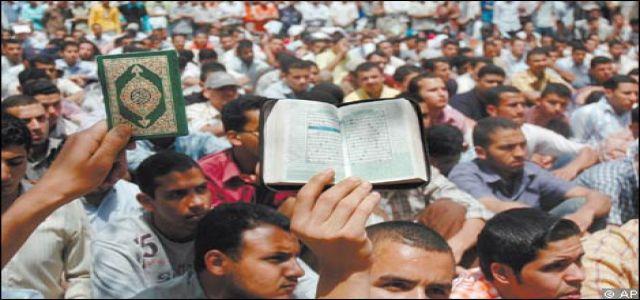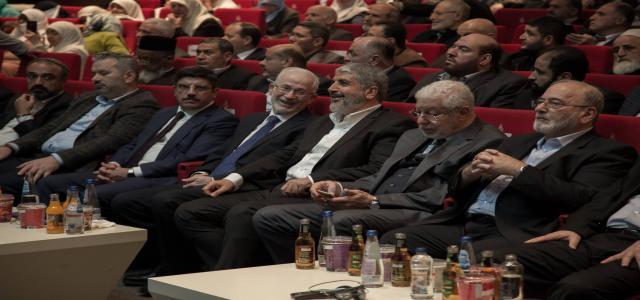- Other Views
- March 1, 2010
- 6 minutes read
Egypt’s Muslim Brotherhood: Opposite effects

The regime appears to have felt that it would be boring simply to repeat the allegations it usually levels at Muslim Brotherhood members. “Membership of an illegal organization” and “distributing printed material that threatens social peace and security” were apparently deemed too tame. Instead, the latest detainees are accused of “creating an organization that subscribes to the ideas of Sayed Qotb and espouses an anti-infidel agenda” and “attempting to organize armed camps for the purpose of mounting hostile activities inside the country”.
The most peculiar charge, perhaps, was leveled by the Higher State security prosecutor against Deputy Chairman Mahmoud Ezzat. According to a report appearing in Al-Masry Al-Yom of 11 February, he is accused of being the real, “secret” leader, having been elected to the post by the Muslim Brotherhood’s international Shura Council two weeks before it was announced that Mohamed Badei was the organization’s new leader. Less high-profile detainees were charged with possession of Qotb’s widely disseminated In the Shade of the Quran.
The regime is mistaken if it thinks such charges will undermine the Muslim Brotherhood’s credibility. Whatever the faults in its political discourse, everyone knows the group is ideologically moderate and seeks to participate peacefully in politics. Attempts to link the organization to terrorism are certain to fail.
The dilemma facing the regime is that it cannot assimilate the Muslim Brotherhood as a legitimate player in the public arena, but nor can it eradicate them and relieve itself, and Egypt, of a protracted and futile confrontation.
One cannot help but wonder why the authorities did not act during the Muslim Brotherhood’s recent internal elections which were accompanied by an unprecedented level of media coverage. Surely it would have been more appropriate, given that the Muslim Brotherhood is an officially outlawed organization, to arrest newly elected Badei “red-handed”, as it were, during the globally televised press conference he held to inaugurate his term of office. Perhaps the regime was hoping that the power struggle that has been raging in the Muslim Brotherhood’s higher echelons would erupt into a schism that would cause the whole organization to crumble. This did not transpire, and the regime fell back on its habitual course of repression and detention.
To explain the timing of the recent clampdown we need to examine the regime’s ongoing strategy to contain the Muslim Brotherhood. Since the mid- 1990s it has regularly rounded up Muslim Brotherhood leaders and tried them before military courts whenever it thought the group was becoming overly confident or ready to engage with a wider public. There have been no less than six military group trials in less than 15 years. The first three were held in 1995 and the next three in 2000, 2003 and 2007. The last of these went on for more than 70 sessions, the longest trial in Egyptian history.
Suppression may tax the Muslim Brotherhood organizationally but it also gives them reason to tighten ranks and focus on recruitment. In today’s political climate, repressive tactics can only be counterproductive, enhancing the group’s popular image and allowing it to appeal to potential recruits on the basis that it is being persecuted. Surely it would be more astute for the regime to allow the Muslim Brotherhood to formally engage in public life since nothing could be more guaranteed to throw it into ideological confusion and organizational disarray.
The Muslim Brotherhood, like most closed organizations, tightens ranks when exposed to outside threats but splinters in environments where it must compete on the basis of political ideas rather than the ability to purchase support through handouts and the provision of social services. When the Muslim Brotherhood unveiled its platform for a proposed political party in 2007 it faced vehement criticism not from the regime but from independent politicians, intellectuals, human rights groups and other members of civil society. I believe that, if there were greater freedom to form political parties in Egypt, Mohamed Habib, who resigned two months ago as deputy to the former supreme guide, or the reformist brother Abdel-Moneim Abul-Fotouh, would establish a political party with no ties to the Muslim Brotherhood. This is precisely what Recep Tayyip Erdogan did when he split away from the Turkish Prosperity Party led by Nijmeddin Erbakan.
The generation gap in the Muslim Brotherhood would give impetus to such a move. Many younger members of the organization are in a state of shock following the elimination of reformists from a hierarchy now dominated by elderly, conservative hardliners. A good many young reformers now love to leave the Brotherhood, their problem being there is nowhere for them to go.
If the regime can not tolerate the Muslim Brotherhood as a political faction, why does it not permit them to re-establish themselves as a philanthropic society engaged solely in charity work? At least then they would fall under the law.
Let me make three observations that relate to the above. First, the Egyptian regime makes no distinction between conservatives and moderates (reformists) within the Muslim Brotherhood, a fact that obviates any possibility of assimilating the group into Egypt’s formal political life. Second, the regime’s current policy will propel the Muslim Brothers to organize themselves secretly and resume subversive activities, at which point the allegation that they are a militant organization bent on violence will become a self-fulfilling prophesy. Third, many groups among the Egyptian political elite have no objection to the suppression and political death of the Muslim Brotherhood on the pretext of saving the country from the specter of a Khomeini-like state. They would then position themselves to carve up the political spoils with the regime.
The Muslim Brotherhood as a legitimate political faction will constitute no real threat to the regime. Any challenge it might face in the future will come from a political figure with sufficient charisma to attract mass public support. My worst fear is that continued pressure on the Muslim Brotherhood will drive it underground.



